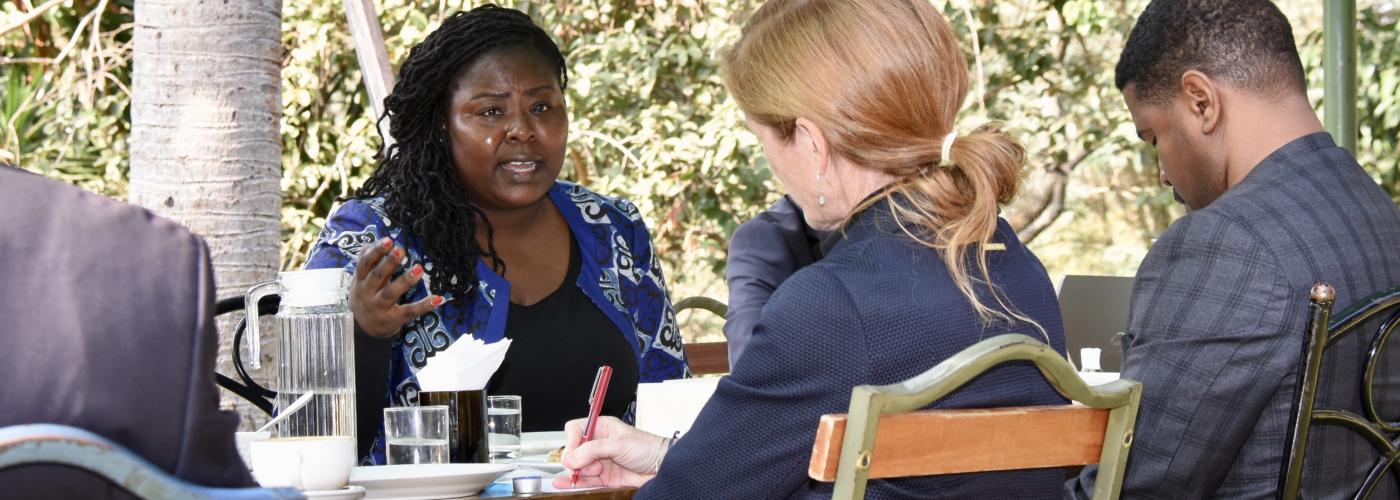Leveraging Behavioral Science and Dialogue to Build Trust for a Better Business Environment
Image

This post was written by George Khisa, William Nielsen, and Moussa Traoré.
Trust is relational and often founded on open, inclusive dialogue and sufficient transparency—to ensure a basis for holding parties in the relationship accountable. And part and parcel of a business environment that is conducive to economic growth is a healthy trust relationship—between government and the private sector and among firms—that promotes investor confidence.
In 1972, Nobel Laureate Kenneth Arrow remarked that "virtually every commercial transaction has within itself an element of trust." Because starting or running a business always implies a risk, entrepreneurs/investors will avoid entering the formal economy or will leave the market if the burdens of interacting with the public sector are too high and the rules of engagement are unclear—yielding a low trust environment and a perception of high risk.
Research supports the positive association between trust and economic conditions. Business transactions tend to be more frequent in more trusting countriesLabonne and Chase, 2008.. Countries with higher levels of trust tend to experience higher rates of GDP growth as well as have stronger institutionsKnack and Keefer, 1997; Zak and Knack, 2001; La Porta et al., 1997.. The evidence also suggests that trust increases in tandem with an improvement in judicial efficiency and reduction in corruptionLa Porta et al. (1997) find that a one standard deviation increase in trust is associated with a 0.7 standard deviation increase in judicial efficiency and a 0.3 standard deviation reduction in government corruption.. Trusted institutions can help move society forward as citizens and businesses are more likely to comply with laws and regulations, pay taxes, contribute economically, tolerate others, and support neighbors.
Unfortunately, trust levels in many countries have declined or continued to stay low in recent years. The root causes of this decline are many and each multifaceted. They include, but are not limited to, perceived corruption, economic inequality, and public rhetoric.
Owing to life experiences, many of us know that our allocation of trust is often driven by various cognitive biases and social norms. Understanding these norms, mental models, and biases is essential to effectively structuring interactions and incentives between private and public parties to a transaction and to enable each party to cooperate and improve its well-being. Behavioral sciences are designed for just such a purpose. They help diagnose areas and causes of limited trust and then facilitate the design of interventions to protect and/or improve trust. The evidence base around specific interventions that foster trust is limited. However there are several activities that are important to support public and private trust. In a 2019 article2019. Kristin M. Lord. Six Ways to Repair Declining Social Trust, available at https://ssir.org/articles/entry/six_ways_to_repair_declining_social_trust. , Kristin Lord notes the ‘Six Paths to Greater Trust,’ included here with a defining feature of each path:
- Competence - Make sure institutions are effective and deliver real benefits for people
- Integrity - Develop future leaders who work for the greater good, not for themselves
- Accountability - Strengthen accountability and transparency
- Dialogue - Engage citizens and private sector in solving challenges
- Equity - Strengthen social inclusion
- Reciprocity - Establish real commitment
Because trust is not static or immutable, and preserving it requires continuous effort, Lord’s second path to greater trust—which calls for building integrity by developing a cadre of future leaders who act for the greater good—is particularly salient. And USAID’s Young African Leaders Initiative (YALI) offers a model of effective, trust-building, public-private dialogue among future leaders.
Since 2015, USAID YALI has worked with more than 4,000 emerging young leaders in the public and private sectors as well as civil society, across 14 countries in East and Central Africa. This experience delivers useful insights for building trust between the public and private sector; chief among the insights is the key role that safe, open, and frank dialogue can play in addressing the misinformed perceptions that drive mistrust.
Young, private sector leaders in the region viewed the public sector as slow, inefficient and corrupt. And those in the public sector viewed the private sector as solely motivated by profit and willing to do anything—including circumvent the law—for gain. Noble motivations and intentions of either side were overshadowed by these perceptions. Facilitated dialogue gave these young leaders their first glimpse into the “other world,” including the positive intentions that drive individuals on both sides to the public sector or private enterprise. YALI participants developed a greater understanding of the policy and legal factors behind slow processes in the public sector. Additionally, those YALI youth who work in the public sector gained a better understanding of how the desire to address social problems gives birth to businesses, and how inefficient public sector processes harm firms, incomes, and government streams that may be leveraged to address development challenges.
Critical outcomes of these types of engagements are greater trust, and shared vision, goals and responsibilities. Among the outcomes is a greater appreciation—on both sides—of the critical role the private sector can play in advocating for faster policy and regulatory changes that curb corruption. YALI’s experience shows that these dialogues help create collective motivation and commitment—across both the public and private sectors—to work together to address development challenges through greater collaboration and trust.
Echoing USAID Administrator Samantha Power, it is time to widen the lens of our economic analysis and better incorporate behavioral science in decision making for development. The nascent field of behavioral economics prompts us to dig deeper in understanding what motivates individual and group decision making in the short and long run. Additionally, it asks us to step away from broadly applying assumptions and rely instead on context-specific evidence and data to address development challenges, which are often culturally unique. As shown by YALI’s experience in East and Central Africa, dialogue is essential to gathering data on what motivates economic actors and in bridging the trust gap that undercuts the private sector’s confidence in the marketplace.

